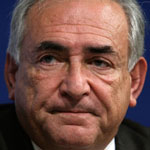
U.S. President Barack Obama, reflecting on government support for the financial sector, said it is dangerous for the economy when companies believe they are too big to fail. "Having had to step in extraordinary ways, we now have even more potential for moral hazard, where financial institutions think to themselves, 'We can continue to take extraordinary risks … because we know that we are too big to fail,'" Obama told BusinessWeek magazine in an interview, according to a transcript released on Wednesday. "I think that's dangerous for the economy and for business." Obama, who took office in January amid the worst economic and financial crises since the Great Depression, defended his young administration against charges of being anti-business. – Reuters
Dominant Social Theme: Not anti-business.
Free-Market Analysis: How about pro-bubble? President Barack Obama is obviously trying to sound responsible and business-like. He has been advised – presumably advised – that he needs to make a statement about being pro-business and also to warn businesspeople, especially in the financial industry away from being complacent about the backing of the federal government. But the trouble with this is twofold.
First of all, the administration, despite its socialist tilt, has not appeared especially anti-business in its public utterances. Instead it has appeared pro-banking as everything about its policy has supported the big money center banks and affiliated financial institutions. Second, and even more importantly, while Obama is now concerned about leaving the impression that the federal government will ensure that large firms and banks remain solvent, how does he explain the bail out of the economy itself?
This is perhaps the most important point. Central banks including the Federal Reserve have poured trillions into the economy propping up the largest financial players. More importantly, the funds have been directed toward liquidity bottlenecks to try to get investing and credit moving again. But what this has done inadvertently is to assure not just industry but an entire population of investors that the market itself, especially Anglo-American markets, will not be allowed to sink into ruin.
Thus, there has been a great deal of talk about "stabilizing the financial system" and the success of central bankers in doing so. But such phrases are euphemisms. In fact, markets were not stabilized. The entire financial system, which was collapsing, was refloated on an ocean of paper money. This has not, however, made the system more stable in the long run, no matter what the president maintains. Here's some more from the article excerpted above:
The president also said his administration had been successful in stabilizing the financial system. "I don't think people understand how close we were to the whole thing unraveling, and the degree to which, had it unraveled, we could be in a much worse situation than we're in right now," he said. "Now that's no consolation for the folks who are out of work or small businesses that are closing. But given how quickly we had to act, how much uncertainty and fear there was out there, in retrospect it is a very significant accomplishment."
Dear reader, do you see the contradiction? In an article in which President Obama is warning that businesses ought not to assume they are too big to fail, the American president is also making the case that his administration has stabilized the financial system.
We would argue that Obama has provided the Western world with the biggest moral hazard of all! Businesses may go under in a crisis but the economy itself, a fiat-money economy to be sure, will never be allowed to sink. So pile in … Yes, let the good times roll. This is moral hazard piled on top of moral hazard.
And the lessons have been learned, unfortunately. At a time when the real economy itself continues to stagger, only months after the entire Western economy seemed destined to fall apart, cable TV programs in America are asking if an appetite for risk is returning among small investors. Amazing.
In fact, small investors have been horribly damaged by the unraveling economy. But the market, buoyed by so much central banking paper money, has taken off – for now anyway. And thus, we find it most ironic that Obama in virtually the same breath warns big business that individual players should never assume they are too big to fail while at the same time boasting that his administration has salvaged the larger economy. What's the difference – except that the moral hazard has been extended to market-sized proportions. And really, the sentiment is a contradiction in terms as SOMEONE has to be bailed out when an economy is stabilized, or a number of someones.

We have a better idea, of course, as we are fond of repeating. Instead of facing yet another escalating economic bailout every decade or so, the powers-that-be ought to consider some sort of precious metals standard that can provide a calmer environment. An escalating moral hazard is to no one's benefit – especially when no one in the mainstream press seems to notice its existence.
